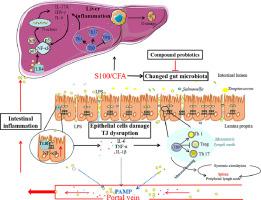The Journal of Nutritional Biochemistry ( IF 5.6 ) Pub Date : 2021-09-11 , DOI: 10.1016/j.jnutbio.2021.108863 Qingqing Liu 1 , Haixia Tian 1 , Yongbo Kang 1 , Yan Tian 1 , Lin Li 1 , Xing Kang 1 , Hao Yang 1 , Yanhong Wang 1 , Jihua Tian 1 , Fan Zhang 1 , Mingwei Tong 1 , Hongyan Cai 1 , Weiping Fan 1

|
Autoimmune hepatitis (AIH) is an immune-mediated type of chronic liver inflammation accompanied by intestinal flora imbalance. Probiotics have been reported to ameliorate imbalances in the intestinal flora. This study aimed to investigate the effects of compound probiotic in the AIH mouse model. AIH mice were gavaged with compound probiotic and injected intraperitoneally with dexamethasone (dex) for 42 days. The results showed that these treatments suppressed hepatic inflammatory cell infiltration, serum transaminase, and Th1 and Th17 cells. However, Treg cells were increased only in the probiotics group, which indicates an immunomodulatory role of the compound probiotic. The compound probiotic maintained intestinal barrier integrity, blocked lipopolysaccharide (LPS) translocation, and inhibited the activation of the TLR4/NF-κB pathway and the production of inflammatory factors in the liver and ileum. Moreover, the compound probiotic treatment increased the abundance of beneficial bacteria and reduced the abundance of potentially harmful bacteria in gut. Compound probiotic may improve ileal barrier function while increasing the diversity of the intestinal flora, blocking the translocation of gut-derived LPS to the liver and therefore preventing activation of the TLR4/NF-κB pathway. The resulting inhibition of pro-inflammatory factor production facilitates AIH remission.
中文翻译:

益生菌通过调节肠道菌群和肠道通透性减轻小鼠自身免疫性肝炎
自身免疫性肝炎 (AIH) 是一种免疫介导的慢性肝脏炎症,伴有肠道菌群失衡。据报道,益生菌可以改善肠道菌群的失衡。本研究旨在探讨复合益生菌在 AIH 小鼠模型中的作用。AIH 小鼠被灌胃复合益生菌并腹腔注射地塞米松 (dex) 42 天。结果表明,这些治疗抑制了肝炎症细胞浸润、血清转氨酶以及 Th1 和 Th17 细胞。然而,Treg 细胞仅在益生菌组中增加,这表明复合益生菌具有免疫调节作用。复合益生菌维持肠道屏障完整性,阻断脂多糖 (LPS) 易位,并抑制 TLR4/NF-κB 通路的激活和肝脏和回肠中炎症因子的产生。此外,复合益生菌处理增加了有益细菌的丰度并减少了肠道中潜在有害细菌的丰度。复合益生菌可以改善回肠屏障功能,同时增加肠道菌群的多样性,阻断肠源性 LPS 向肝脏的易位,从而防止 TLR4/NF-κB 通路的激活。由此产生的促炎因子产生的抑制促进了 AIH 的缓解。复合益生菌可以改善回肠屏障功能,同时增加肠道菌群的多样性,阻断肠源性 LPS 向肝脏的易位,从而防止 TLR4/NF-κB 通路的激活。由此产生的促炎因子产生的抑制促进了 AIH 的缓解。复合益生菌可以改善回肠屏障功能,同时增加肠道菌群的多样性,阻断肠源性 LPS 向肝脏的易位,从而防止 TLR4/NF-κB 通路的激活。由此产生的促炎因子产生的抑制促进了 AIH 的缓解。



























 京公网安备 11010802027423号
京公网安备 11010802027423号